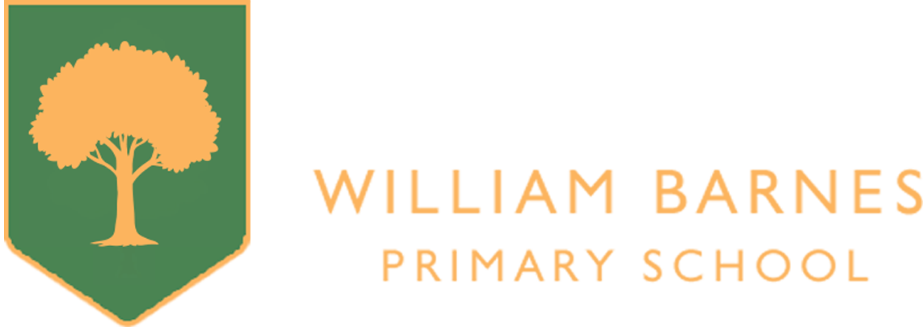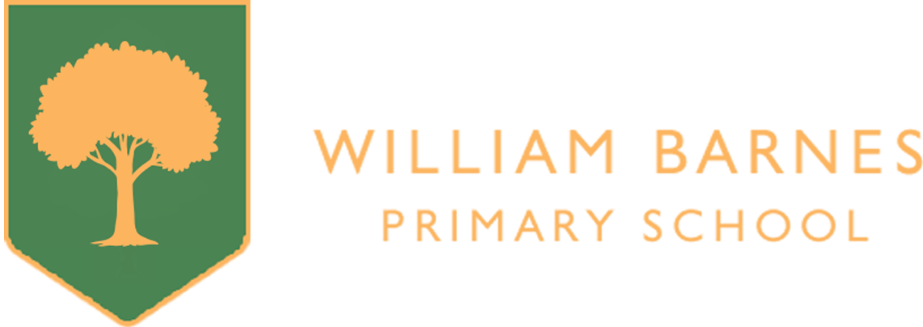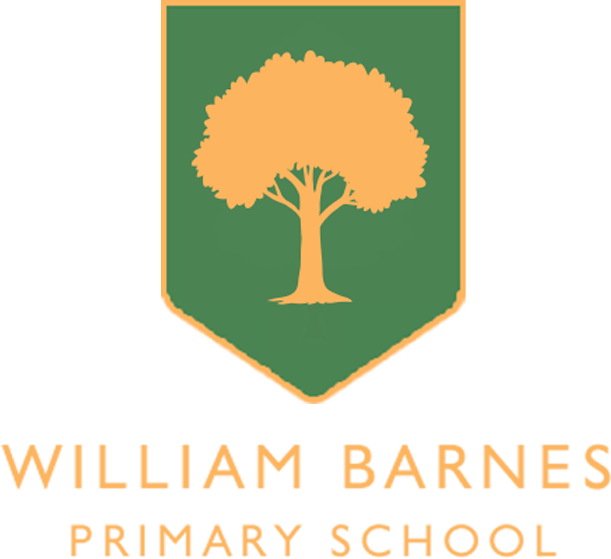English at William Barnes Primary School
At William Barnes Primary School, we believe that children deserve:
- To be set appropriate and stimulating learning challenges
- To be taught well and be given the opportunity to learn in ways that maximise the chances of success
- To be given high quality feedback, which highlights successes and areas for improvement
- To have adults working with them to tackle the specific barriers to progress they face.
It is also our objective that :
- Children develop a lasting love of all aspects of English which will aid and enhance their further education and life.
- Children are given the opportunity to experience the widest variety of the written and spoken word possible.
- Children will develop a love of books and reading.
What is the English Curriculum?
The English Curriculum contains three main strands –
The ability to read, make sense of text and to enjoy the written word.
The ability to write accurately in a variety of styles and for a variety of reasons. This includes the ability to spell and the understanding of grammar rules and conventions.
The ability to speak, present and listen effectively.
Whilst all of our English lessons contain reading, writing and speaking and listening activities, each of these elements will have dedicated time and lessons for their specific skills.
Reading
Reading is predominately taught through the learning of phonics, with fidelity in teaching and assessment to the DfE Validated Scheme – Floppy’s Phonics. This begins in Reception and continues until the children have successfully completed the phonics scheme and are reading with fluency at an age-appropriate level. Most often this is by the early stages of Year 2 but continues into Key Stage 2 if a child still requires ongoing support with learning phonics. They are taught the sounds that letters, or groups of letters make, so that they build up their ‘phonic knowledge’ of the English Alphabetic Code. This gives them the skills to decode words by blending phonemes together. We follow the Floppy’s Phonics scheme which is supported by decodable reading books for all children, including those in Key Stage 2 where we have age-appropriate decodable books for those children still learning phonics. This ensures that children are given ample opportunities to develop their reading skills with reading material that closely matches their phonetic stage of learning and supports progress towards reading fluency. A well organised reading scheme then supports later development of reading and comprehension. At William Barnes, there is much emphasis on the joy of reading, enjoying texts in a variety of contexts, choice in reading and the ability to fully understand the text.
As children become more proficient in their reading, they move on to the higher reading levels and, finally, are encouraged to pursue their own preferences, find genres and authors to follow and bring books in from home. Fully understanding texts, being able to infer deeper meanings and the intent of the author, become the key skills for more confident readers. The school uses the VIPERS approach to developing comprehension and word level skills and parents are encouraged to use this at home.
Guided Reading is a key activity throughout the school. This is an opportunity for small groups of children to sit work with an adult, sharing a texts and developing their skills using VIPERS.
Whole class Guided Reading is used as tool for reading development where appropriate, and every class has whole class texts to use for this.
1:1 Reading is important also, and given high priority where appropriate and necessary. We have a team of reading volunteers and Year 6 are also Reading Guardians to younger children, passing on their love of reading. Priority Readers are identified by class teachers and these children are heard read very regularly.
Reading Journals are used by children from Reception to Year 6. These are used as a record of home reading, and the expectation across the school is that all children will read at home at least 5 times a week. This is monitored in school. We encourage parents to become involved in this process as much as possible.
All children at William Barnes Primary have class visits to the Sturminster Newton Town library where all children can borrow books on a class card. They all take a book home from the school library and classes encourage reading for pleasure with access to high quality texts for the children to choose.
All children have daily story time using high quality texts as well as rhyme time and singing in the lower years.
Writing
We aim to make writing, from the earliest stages of mark making through to the detailed, focused texts written by our older children, to be a positive experience. We emphasis that writing is creative and children are encouraged to write in a variety of different styles and for different reasons and audiences.
A secure understanding of the Alphabetic Code is an essential part of writing development and the principals of phonics teaching are used throughout the school to support accurate spelling choices. Children are encouraged to use the Alphabetic Code to support their understanding of how sounds are written in different ways, so that they can segment words and spell them correctly. Once phonic knowledge is secure, children are taught further rules of spelling, so that they can apply these rules to any word they choose to use in their writing.
As well as ‘word level’ activities, children are taught ‘sentence level’ skills and this ranges from writing short phrases, their name and labels in the earliest stages to longer compound and complex sentences at later stages. We have clear expectations for the development of sentence level skills and there is much emphasis on this skill in classroom displays, children’s targets and the assessment of children’s writing.
The No Nonsense Grammar (Y1-6) and The No Nonsense Spelling (Y2-6) Programmes are used to ensure coverage of Grammar and Spelling objectives.
Class teachers are very aware of the expectations for the ‘expected’ level of writing for each year group. These expectations include, spelling, punctuation, sentence and text level requirements. Children are taught to work towards these expectations and feedback on their work is focused on the improvement required.
Children are also taught how to write in different styles. This includes the writing of stories, instructions and recounts of events in early writing through to specific story structures, explanations, reports, journalistic writing and discussion texts at later stages. Children are taught how language, structure and layout change across these different styles.
All children have a ‘Writer’s Workshop’ book which follows them throughout the school. This is a special book which is used for significant pieces of writing and often includes choice and more independence.
To encourage links with home and the importance of planning and talk before writing, every half termly we run the HomeTalkSchoolWrite (HTSW) project. This is where every child is sent home with a planning framework to prepare at home with parents. A letter is sent home and the children have a few days to ‘HomeTalk’ before writing independently in school. This is followed by a HTSW assembly, where children celebrate the joy of writing and share some of their achievements. All parents receive a copy of the unedited work.
Here are the sentence targets and expectations developed throughout the school:
| Class and Age | Targets and Expectations |
| Reception
Year 1 Year 2 Age 4-7 |
Can I write my own name.
Can I say a simple sentence. Can I write captions and labels. |
| Can I write a sentence with a capital letter at the beginning and a full stop at the end. | |
| Can I write single words and phrases. | |
| Can I compose, say, write a sentence. Can I check for sense. | |
| Can I join 2 sentences to make a longer one.
eg. Mum went to the shop and she bought an apple. |
|
| Can I begin to write sentences using different time connectives.
eg. Later, Mum went to the shop and bought an apple. |
|
| Can I join sentences using words other than ‘and’ (or/and/but/when/if/that/so/because)
eg. Later Mum went to the shop so that she could buy an apple. |
|
| Year 3
Year 4 Year 5 Year 6 Age 7-11 |
Can I start sentences with adverbial clauses and phrases(when/where/how)
eg. Once you have finished the icing, put the bowl to soak. Along the back straight, the long distance runner dropped out. |
| Can I compose a complex sentence, using a subordinate clause.
(Drop in clause – who/whose/which) eg. The knight, who was tired, made his way to his castle. The dolphin, which is a mammal, lives in the sea. |
|
| Can I use sentences beginning with a subordinating conjunction. (subordinating)
eg. Because she was ill, Julie did not play in the match. Whenever we are upset, we talk to our teacher. |
|
| Can I use sentences beginning with a
verb +ing or adjective +ed. eg. Snorting loudly, the dragon collapsed to the ground. Shattered and defeated, the building lay in ruins. |
|
| Can I use a variety of sentences (3 types of complex sentences) to suit text type, purposes and readers. |
Speaking and Listening
Skills in Speaking and Listening are taught throughout the school, both as individual elements but also as important skills required for learning in general.
In the earliest stages, this will include the ability to decipher different sounds, to speak clearly, present short ideas and to show listening behaviour in a variety of contexts. The ability to debate, compromise, rehearse, speak to audiences of different sizes, to adapt speech to different contexts and present ideas clearly and to speak in role are developed as children become more sophisticated with speaking and listening.
All classes engage in well organised and practised ‘Talking Partners’ when it is appropriate to their learning. We feel very strongly that this is an extremely important opportunity for children to speak about their ideas, understanding and opinions and that all of these are better out of their head than in.
Drama and role-play are also used throughout the school to develop speaking and listening skills. So much is gained from children’s opportunity to plan a story through drama or to think about the intentions of someone else through role-play.
Interventions
At William Barnes, we believe that all children should be supported to be able to access and achieve success within age-related expectations and that some children will require more support than others to achieve this. We have a variety of intervention strategies in place to support children towards closing the gap in reading, writing or speaking and listening. These include Speech and Language therapy, additional Floppy’s Phonics across the school, Catch-Up Tutoring sessions, SNIP, Nessy Spelling Programmes, 1:1 and Rapid Readers Reading Programmes, Wellcome and Nellie projects.




